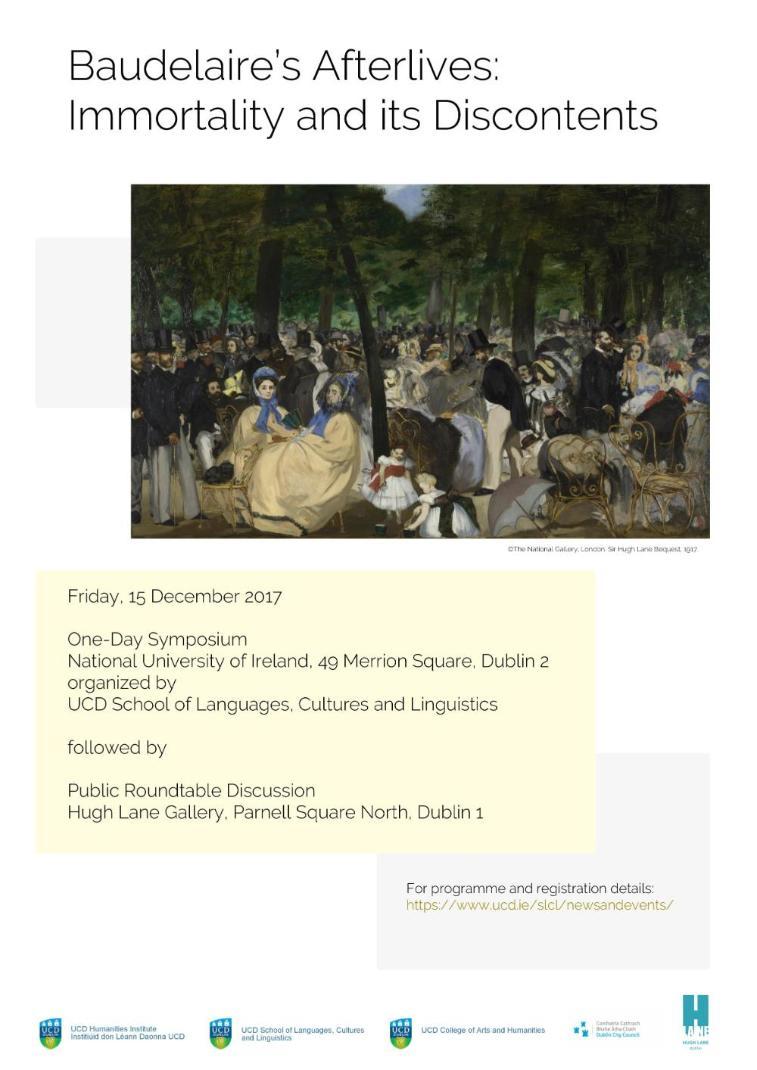Baudelaire’s Afterlives
(opens in a new window)Baudelaire’s Afterlives: Immortality and its (opens in a new window)Discontents
- About the conference (English)
- About the conference (French)
- Conference Programme
- Roundtable Discussion
©The National Gallery, London. Sir Hugh Lane Bequest, 1917.
One-Day Symposium (National University of Ireland, 49 Merrion Square, Dublin 2) organized by UCD School of Languages, Cultures and Linguistics followed by Public Roundtable Discussion (Hugh Lane Gallery, Parnell Square North, Dublin 1) on 15 December 2017.
2017 marks the 150th anniversary of the death of Charles Baudelaire, who remains one of the most celebrated French writers of the nineteenth century. It is far from clear what Baudelaire himself might have made of his posthumous reputations as poet, critic, translator and theorist of modernity. In campaigning for a seat in the Académie française, he apparently aspired to join its community of literary ‘Immortals’, yet he was also haunted by the intolerable prospect that spleen and ennui might pursue him beyond the grave. In Baudelaire’s mind, there was a risk that immortality might take the form not of the reassuring recognition of posterity, but rather that of the restlessness of the undead.
The aim of this symposium is to explore some of the ways in which Baudelaire’s work has outlived him and so to investigate how he lives on, perhaps despite himself, in contemporary culture. Which of the multiple dimensions of Baudelaire’s career have continued (or ceased) to resonate in the years since his death, and which have taken on new relevance today? In the early decades of the twenty-first century, how alive, or how undead, is Baudelaire?
There is no fee for the symposium but, due to restrictions on space, those interested in attending are requested to register electronically in advance (please email: douglas.smith@ucd.ie).
The roundtable is free and open to the public.
Organizing Committee: Dr Douglas Smith, Professor Mary Gallagher, Professor Michael Brophy, UCD School of Languages, Cultures and Linguistics
The event is generously supported by the UCD Humanities Institute, the UCD School of Languages, Cultures and Linguistics and the UCD College of Arts and Humanities.
(opens in a new window)Les Vies posthumes de Charles Baudelaire : une immortalité inquiète
Journée d’étude (National University of Ireland, 49 Merrion Square, Dublin 2) organisée par UCD School of Languages, Cultures and Linguistics suivie d’une Table Ronde (Hugh Lane Gallery, Parnell Square North, Dublin 1) le 15 décembre 2017
L’année 2017 marque le 150e anniversaire de la mort de Charles Baudelaire, qui reste l’un des écrivains français les plus célèbres du dix-neuvième siècle. Il est difficile de savoir ce que Baudelaire lui-même aurait pensé de sa réputation posthume dans les domaines de la poésie, de la critique, de la traduction et de la théorie de la modernité. D’une part, sa candidature à l’Académie française témoigne, paraît-il, d’un désir d’appartenir à cette communauté d’‘Immortels’. D’autre part, son œuvre exprime la peur d’être tourmenté par le spleen et l’ennui même au-delà de la tombe. Pour Baudelaire, l’immortalité risque de prendre la forme non pas de l’appréciation gratifiante de la postérité mais de la morne agitation d’un mort-vivant.
Le but de cette journée d’études est d’examiner comment l’œuvre de Baudelaire lui a survécu et donc d’explorer comment le poète vit encore, peut-être malgré lui-même, dans la culture contemporaine. Parmi les multiples dimensions de la carrière de Baudelaire, lesquelles ont retenu (ou perdu) leur pertinence depuis sa mort et lesquelles ne commencent qu’aujourd’hui à avoir un retentissement? Si l’œuvre de Baudelaire reste en vie au début du XXIe siècle, de quel type de vitalité s’agit-il? Baudelaire a-t-il été pleinement ressuscité par la postérité ou survit-il plutôt en tant que mort-vivant?
Comité d’organisation: Douglas Smith, Mary Gallagher et Michael Brophy, UCD School of Languages, Cultures and Linguistics.
En ce qui concerne la journée d’étude, il n’y a pas de frais d’inscription, mais en raison du nombre limité des places disponibles, on vous prie de vous inscrire d’avance par courrier électronique (douglas.smith@ucd.ie).
La Table ronde est gratuite et ouverte au public.
Cet événement a bénéficié du soutien généreux du UCD Humanities Institute, de la UCD School of Languages, Cultures and Linguistics et du UCD College of Arts and Humanities.
(opens in a new window)Baudelaire’s Afterlives, Symposium (NUI, Merrion Square)
9. 00 Introduction
9.15-10.15 Panel One
Barbara Wright (Trinity College Dublin): ‘The Legacy of Baudelaire: A New Way of Seeing?’
David Scott (Trinity College Dublin): ‘Translating Baudelaire’s Poetry for a Twenty-First Century Audience’
10.15-11.15 Panel Two
Michael Kelly (University of Limerick): ‘Baudelaire and the Poetic Margin: Generic Resistances and Human Remainders in the Contemporary Scene’
Stephen Schwartz (University College Dublin): ‘Varieties of Autonomy in Baudelaire’
11.15-11.30 Coffee
11.30-12.30 Panel Three
Claire Moran (Queen’s University Belfast): ‘Baudelaire and the Aesthetics of the Interior’
Alan English (Dublin City University): ‘The “Cursed Poet” in the Twenty-First Century: Representations and Incarnations’
12.30-1.00 Panel Four
Michael Brophy (University College Dublin): ‘“L’Amour des choses mortelles” or The Legacy of Life Now: Yves Bonnefoy and Baudelaire’
Mary Gallagher (University College Dublin): ‘Gothic Creole: Between the Living Dead and the Undead in Les Fleurs du mal’
1.00-2.00 Lunch
2.00-3.00 Plenary
Maria Scott (University of Exeter), ‘“Mon semblable, mon frère”: Baudelaire and the Science of Difficult Empathy’
(opens in a new window)Public Roundtable (Hugh Lane Gallery, Parnell Square)
3.30-4.45
Featuring the poet Harry Clifton, Jessica O’Donnell from the Hugh Lane Gallery, Maria Scott, Michael Brophy and Douglas Smith
